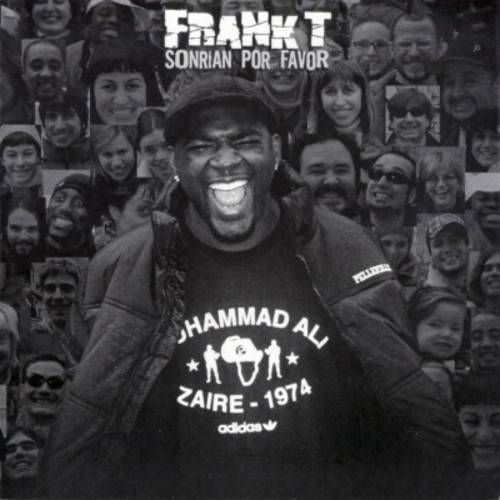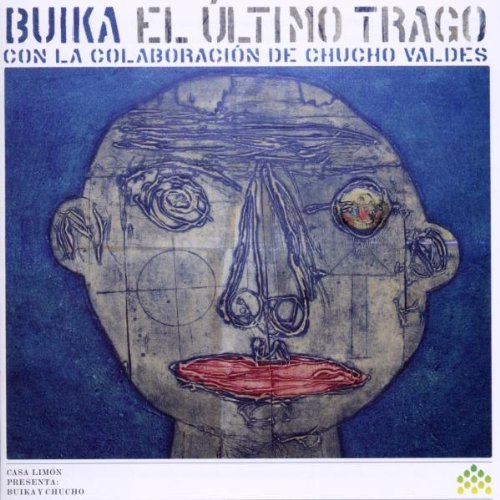The intersection of race and gender in the music and lyrics of three Afro-Spanish artist
Cultural Journalism
Publication: Her Campus Leeds
Publication: Her Campus Leeds
By: Silvia Calvo
Date: 17.01.2017
Publication: Her Campus Leeds
The intersection of race and gender in the music and lyrics of three Afro-Spanish artist
This article will discuss the result of the intersection of race and gender in the production of three of the most important Afro-Spanish musical artists: El Chojin, Frank T and Concha Buika. These musicians whose work is analyzed have in common that they have Africa Origin and have been born or brought into Spain in the 1970s before the country experimented an immigration boom in 2000s.
In this research, two main characteristics will be taken into account. The African origin of the musicians, and how a hegemonic imaginary that dictates the appearance of a Spanish person from a racialized point of view, could potentially affect their musical message. And the second one, gender. Two male figures and one female were picked, because the aim of the research is to identify if the nature of the gender has created differences in the sense of engagement to Spain represented their music. In pursuance of this, their music and their lyrics will be analyzed, as well as determining the aspects of their work such as the influences of their chosen rhythms, the feelings or issues identified in the songs, and the social message.
After analyzing their production, the following study will argue that these three artists use their condition of being Afro-Spaniard as a distinguishing factor from any other Spanish artist. Although they all use their hybrid identities as an advantage, there is a distinction between the rappers and Concha Buika. On one hand, the two MCs tend to use their African origins in order to support a message of protest with the aim of threat the hegemonic system. On the other hand, the female singer uses this racial aspect in order to enrich her production using Spanish influences as her musical roots.
In this research, two main characteristics will be taken into account. The African origin of the musicians, and how a hegemonic imaginary that dictates the appearance of a Spanish person from a racialized point of view, could potentially affect their musical message. And the second one, gender. Two male figures and one female were picked, because the aim of the research is to identify if the nature of the gender has created differences in the sense of engagement to Spain represented their music. In pursuance of this, their music and their lyrics will be analyzed, as well as determining the aspects of their work such as the influences of their chosen rhythms, the feelings or issues identified in the songs, and the social message.
After analyzing their production, the following study will argue that these three artists use their condition of being Afro-Spaniard as a distinguishing factor from any other Spanish artist. Although they all use their hybrid identities as an advantage, there is a distinction between the rappers and Concha Buika. On one hand, the two MCs tend to use their African origins in order to support a message of protest with the aim of threat the hegemonic system. On the other hand, the female singer uses this racial aspect in order to enrich her production using Spanish influences as her musical roots.

Until 1950 Spain could be described as a country dedicated to the first sector whose population was emigrant. If the evolution of Spanish immigration is considered since 1960s, it can be said that the country had experimented three important periods. The first one between (1962-1967), during this five years the number of residents increased by an average of (12.9% annual). The second extends along 1980 and 1996, in which the average decreased at (11.5% annual). Finally, the third between (1996-2002), that represents the biggest increase in the foreign immigration, which grew around (21.3% per year). In 2002 the total number of foreigners in Spain doubled the amount, going from 538,000 to 1.243.000, whose African population represented (26%). Since this moment a new circle started and the immigration became one of the most prominent features of the Spanish social structure (Colectivo Ioé, 2002).
The musicians taken as case study lived their childhood in Spain during the second immigration period, previously refer, due to this the Afro-Spanish collective did not have a strong presence inside the Spanish population until the musicians reached their twenties (approximately). The lack of ethnic and racial co-existence between Spaniards and foreign population from African countries, is one of the main factors that made in Frank T, El Chojin and Concha Buika sound very different from other artists of the music scene of that time, but before starting the musical analysis a little biography of each artist will be presented:
María Concepción Balboa Buika, known as Concha Buika is a Spanish singer born in the early 1970s, on the Balearic island of Palma de Mallorca. She is the daughter of Equatoguinean parents, that were political exiles from their original country due to the political regime. This artist is considered singer, poet, composer and music producer. In her beginnings, she started to get in touch with the music industry a as a drummer, and it would be in the late 1990s when she turned into singing in the scene of Madrid nightclubs. From the three cases of study she is the one that has a biggest international projection. In 2008 she was nominated for a Latin Grammy Award in the category of Album of the Year for her album Niña de Fuego and it would be in 2014 when she was nominated again for La Noche Más Larga as the Best Latin Jazz Album at the 56th Annual Grammy.
The musicians taken as case study lived their childhood in Spain during the second immigration period, previously refer, due to this the Afro-Spanish collective did not have a strong presence inside the Spanish population until the musicians reached their twenties (approximately). The lack of ethnic and racial co-existence between Spaniards and foreign population from African countries, is one of the main factors that made in Frank T, El Chojin and Concha Buika sound very different from other artists of the music scene of that time, but before starting the musical analysis a little biography of each artist will be presented:
María Concepción Balboa Buika, known as Concha Buika is a Spanish singer born in the early 1970s, on the Balearic island of Palma de Mallorca. She is the daughter of Equatoguinean parents, that were political exiles from their original country due to the political regime. This artist is considered singer, poet, composer and music producer. In her beginnings, she started to get in touch with the music industry a as a drummer, and it would be in the late 1990s when she turned into singing in the scene of Madrid nightclubs. From the three cases of study she is the one that has a biggest international projection. In 2008 she was nominated for a Latin Grammy Award in the category of Album of the Year for her album Niña de Fuego and it would be in 2014 when she was nominated again for La Noche Más Larga as the Best Latin Jazz Album at the 56th Annual Grammy.

Franklin Tshimini Nsombolay, better known by his stage name Frank T was born in Zaire, the actual Democratic Republic of the Congo. This MC has lived in Spain since the age of 2, more exactly in a suburb district of Madrid called Torrejón de Ardoz. His career started as a part of a group called EI Club de los Poetas Violentos, but is in (1994) when he decided to star his solo career, after this step his first album was released in (1996) under the name Konfusional. Only three years later Frank T reached one of his best professional moments, with the released of his single La Gran Obra Maestra that was a complete success (Chojín and Reyes, 2010). Currently, he stills active in the music industry but more as a producer than as an MC, he started to combine the two fields in the 90s and since then he has released two albums, Sonrían por favor (2006) and Soy una tostadora (2010).
El Chojin, whose real name is Domingo Antonio Edjang Moreno, was born in 1977 in Madrid, he is the soon of Equatorial Guinean father and Extremaduran mother. In his childhood, he left in the same town as Frank T, Torrejón de Ardoz. The relationship between this two artists went beyond the hometown as is Frant T was the first is rapper in trusting El Chojin inviting him to join his tour in (1997), two years later El Chojin launched his first album Mi turno (1999). From this year till today he has released 13 albums, almost one album per year, becoming one of the most popular and productive artists in the scene of the Spanishh rap (Marcos, 2010).
Moving into analyzing their musical influences, it is of vital importance to acknowledge Frank T and El Chojin who are from same district. Due to the establishment and occupation of an American military base as a result of the Cold War policy in Torrejón de Ardoz between 1955 and 1992. Thanks to this military center, the American culture and lifestyle trickled down into this suburb of Madrid. The occupation of the soldiers brought with them manifestations of modern African-American music, this had a huge impact on the young generation of that time, which cannot be understated. This route of cultural exchange with the US hip-hop community made rap music became popular in the district (Green, 2013).
El Chojin, whose real name is Domingo Antonio Edjang Moreno, was born in 1977 in Madrid, he is the soon of Equatorial Guinean father and Extremaduran mother. In his childhood, he left in the same town as Frank T, Torrejón de Ardoz. The relationship between this two artists went beyond the hometown as is Frant T was the first is rapper in trusting El Chojin inviting him to join his tour in (1997), two years later El Chojin launched his first album Mi turno (1999). From this year till today he has released 13 albums, almost one album per year, becoming one of the most popular and productive artists in the scene of the Spanishh rap (Marcos, 2010).
Moving into analyzing their musical influences, it is of vital importance to acknowledge Frank T and El Chojin who are from same district. Due to the establishment and occupation of an American military base as a result of the Cold War policy in Torrejón de Ardoz between 1955 and 1992. Thanks to this military center, the American culture and lifestyle trickled down into this suburb of Madrid. The occupation of the soldiers brought with them manifestations of modern African-American music, this had a huge impact on the young generation of that time, which cannot be understated. This route of cultural exchange with the US hip-hop community made rap music became popular in the district (Green, 2013).

In particular, the political rap genre or ´concious rap´ had more influence within the suburb and therefore the two MCS. This style of hip-hop was born in the 1980’s inspired by African-American musicians that rapped about the political injustices of the late 1970’s and early 1980´s with jazz and soul influences along with funky flashes. According to (Chojín and Reyes, 2010), this would be one of the most eminent contributions to Spanish rap in the early 1990s.
KRS-One an early pioneer of conscious rap with BDP (Boogie Down Productions) used his fierce and incendiary style to lead the group, his style continued throughout his solo work. This signature rapping style was adopted by El Chojin and Frank T. This “message rap” was as a tool for expressing their thoughts, calling the attention of a social segregation that they were experiencing. Promoted by the preconception of Spain as a place with a hegemonic ethnicity, songs like Frank T´s La rebelión de los X´ianos or El Chojin´s Extra are a representation of the MCs asking for social equality and acceptance in society for different races.
Si estamos obligados a convivir hagámoslo bien.
Y os digo por experiencia que ser diferente cuesta,
pero sólo cuando te lo recuerdan.
Yo nací español hasta que me convencieron de que no lo era,
hace mucho tiempo ya, érase que se era.
El Chojín, Extra, 8Jin (2005).
The two rappers are proof of a dialogue between Spain and the sounds of the international black diaspora (Green, 2013), creating and initiating a powerful musical triangle formed among America, Africa, and Spain. These influences were translated into rhythms characterized by the use of simple but rough musical bases made by battery loops and samples of Funk and Soul, all combined with sampled drum beats. This aesthetic decision served in order to give more prominence to their message, leaving the music in the background to accompany and serve mainly to accentuate their lyrics.
KRS-One an early pioneer of conscious rap with BDP (Boogie Down Productions) used his fierce and incendiary style to lead the group, his style continued throughout his solo work. This signature rapping style was adopted by El Chojin and Frank T. This “message rap” was as a tool for expressing their thoughts, calling the attention of a social segregation that they were experiencing. Promoted by the preconception of Spain as a place with a hegemonic ethnicity, songs like Frank T´s La rebelión de los X´ianos or El Chojin´s Extra are a representation of the MCs asking for social equality and acceptance in society for different races.
Si estamos obligados a convivir hagámoslo bien.
Y os digo por experiencia que ser diferente cuesta,
pero sólo cuando te lo recuerdan.
Yo nací español hasta que me convencieron de que no lo era,
hace mucho tiempo ya, érase que se era.
El Chojín, Extra, 8Jin (2005).
The two rappers are proof of a dialogue between Spain and the sounds of the international black diaspora (Green, 2013), creating and initiating a powerful musical triangle formed among America, Africa, and Spain. These influences were translated into rhythms characterized by the use of simple but rough musical bases made by battery loops and samples of Funk and Soul, all combined with sampled drum beats. This aesthetic decision served in order to give more prominence to their message, leaving the music in the background to accompany and serve mainly to accentuate their lyrics.

In his website El Chojin explains to the public his main influences, these are: “Notorius B.I.G, Guru, Jay Z, Busta Rhymes, Method Man, Common” (Elchojin.net, 2017). All of these artists are rappers of African American descent. The same happened in an interview with Hip Hop Life Magazine where Frank T was asked about his different types of influences, the three that were about music were all MCs of African American descent: Big Daddy Kane, Public Enemy, Foreign Exchange (Hip Hop Life, 2016).
The two rappers chose a music genre whose nature does not belong or align to Spanish culture, but instead of African-American culture, however, this was not the case with Concha Buika. The female artist is in the opposite position because she found escapism through typical Spanish genres and weaved it together with flamenco influences. The Scholar (Martinez 2013:90) argued Buika´s songs are “firmly rooted in the sentimental memory of Spain”.
Her first four albums were all influenced by Spanish popular culture and had collaborations with important native musicians such as Javier Limón. In her first album Mestizüo (2000), she presented versions of Coplas, which are songs rooted in Hispanic culture. In 2005 she released her second in which, “buikás voice first acquires a hibrity between a timbre associated with blackness and the Spanishness of the actual vocal performance” (Green 2014: 54) fusing flamenco with neo-soul. Mi niña Lola (2006) and La niña de fuego (2008) followed the same path, Coplas with latin jazz and groove flashes and with Spanish guitar as the main instrument throughout combined with flamenco golpes.
Therefore, it can be argued that not all artists have to base their music on others country´s cultural manifestation because their national identity is hybrid. As claimed by the scholar (Green 2014) Buika´s career can be taken as proof that the black diaspora can feel represented by the country of origin. However, it can be claimed that Frank T and El Chojin are proof of integration, whose belonging within Spain is expressed through the social compromise exposed in their lyrics.
In order to solve a society problem, some steps have to be followed such as detecting the problem, finding a solution and taking active part in the challenge of correcting the situation. Although their music is more demanding within the Spanish society Frank T and El Chojin have dedicated a substantial part of their work to launch a socio-political message with an aim to make a change within the nation that they belong to.
The two rappers chose a music genre whose nature does not belong or align to Spanish culture, but instead of African-American culture, however, this was not the case with Concha Buika. The female artist is in the opposite position because she found escapism through typical Spanish genres and weaved it together with flamenco influences. The Scholar (Martinez 2013:90) argued Buika´s songs are “firmly rooted in the sentimental memory of Spain”.
Her first four albums were all influenced by Spanish popular culture and had collaborations with important native musicians such as Javier Limón. In her first album Mestizüo (2000), she presented versions of Coplas, which are songs rooted in Hispanic culture. In 2005 she released her second in which, “buikás voice first acquires a hibrity between a timbre associated with blackness and the Spanishness of the actual vocal performance” (Green 2014: 54) fusing flamenco with neo-soul. Mi niña Lola (2006) and La niña de fuego (2008) followed the same path, Coplas with latin jazz and groove flashes and with Spanish guitar as the main instrument throughout combined with flamenco golpes.
Therefore, it can be argued that not all artists have to base their music on others country´s cultural manifestation because their national identity is hybrid. As claimed by the scholar (Green 2014) Buika´s career can be taken as proof that the black diaspora can feel represented by the country of origin. However, it can be claimed that Frank T and El Chojin are proof of integration, whose belonging within Spain is expressed through the social compromise exposed in their lyrics.
In order to solve a society problem, some steps have to be followed such as detecting the problem, finding a solution and taking active part in the challenge of correcting the situation. Although their music is more demanding within the Spanish society Frank T and El Chojin have dedicated a substantial part of their work to launch a socio-political message with an aim to make a change within the nation that they belong to.

In terms of national identification, a concept that can be viewed in a psychological way as “an awareness of difference”, a “feeling and recognition of ‘we’ and ‘they'” (Yoonmi, 2012:9) the three artists have expressed that their national identity has been put into doubt, not by themselves, by the community that has had conflicts to recognize them as Spanish citizens.
Yo solamente soy el producto de una ecuación sin resultado,
Una equis al final de una operación que nunca nadie ha terminado.…
Me educaron por aquí, pero dicen que soy de allí,
Pero allí no me comprenden ya que hablo el idioma de aquí,
Frank T, La rebelión de los X´ianos,
Los pájaros no pueden vivir en el agua porque no son peces (1998).
I´m not from America
where are my brothers
I am from the barrio
Madrid siempre será el centro
La generacion española new afro spanish generation
Concha Buika, New Afro Spanish Generation, Buika (2005)
No soy un hombre… no soy hetero, no soy afro, ni español, ni ateo;
[…]
Soy y no soy… y voy cambiando a lo largo del camino.
Y soy, y no soy… como todos también voy buscando mi sitio.
El Chojín, Soy y no soy, Recalculando Ruta (2017).
In the three songs, the public is able to appreciate a certain autobiographical tone, where the “I” who sings is related to the story that is told. Although each one expresses the feeling of being Afro-Spanish in a different way, all seem to agree on launching a message which is meant to subtracted importance of bureaucracy dependency in nationality. In a interview with El País Chojin said “Uno no es de donde quiere, sino de donde le colocan” (Carretero, 2016) this affirmation can be understood as validation that the musicians do not feel uncomfortable nether with their African or Spanish roots, they feel uncomfortable with rest excluding them from the auto-determination due to a dominant conception of what is to be Spanish.
The Scholar (Green 2013) has defended, that El Chojin or Frank T had construct alternative identities in dialogue with the international black diaspora. However, in their lyrics, the three singers have developed a model that allows them to identify themselves not only as a representation of a race but instead as free individual agents that want to have the right of their own auto-determination based in other multiple features. They defend that their human condition allows them to be identified with all those features that they want, going beyond the connection with the black diaspora.
Tanta patria y tanta conviccion vas a acabar sin corazon,
yo no porque yo libre soy
Concha Buika, New Afro Spanish Generation, Buika (2005)
In songs like N.E.G.R.O (2009), and Solo hace falta un (2017) El Chojin calls for tolerance towards the other and he embaraces his condition accepting his difference from the rest in positive way.
Soy diferente cuando diferente es ser más abierto,
No quepo en un país, ni en una raza, ni en un credo.
El Chojín, Soy y no soy, Recalculando Ruta (2017).
y sólo por esa causa no se es de ¡ningún país! […]
y aunque yo voy más allá de tener que ser de ningún lado
mi país es el estado mental donde las rimas me he currado
Frank T, La rebelión de los X´ianos,
Los pájaros no pueden vivir en el agua porque no son peces (1998).
Although this supranational-identity is defended by the three artists, there is a big difference between the males and the female musicians based on the threat that they conform to the Spanish hegemonic national identity. While the two rappers include in their songs numerous references to the black race, (mainly focused of the acceptance of this group in the Spanish culture), Concha Buika´s music has a more sentimental thematic, (that does not implicate a sociopolitical discourse).
Yo solamente soy el producto de una ecuación sin resultado,
Una equis al final de una operación que nunca nadie ha terminado.…
Me educaron por aquí, pero dicen que soy de allí,
Pero allí no me comprenden ya que hablo el idioma de aquí,
Frank T, La rebelión de los X´ianos,
Los pájaros no pueden vivir en el agua porque no son peces (1998).
I´m not from America
where are my brothers
I am from the barrio
Madrid siempre será el centro
La generacion española new afro spanish generation
Concha Buika, New Afro Spanish Generation, Buika (2005)
No soy un hombre… no soy hetero, no soy afro, ni español, ni ateo;
[…]
Soy y no soy… y voy cambiando a lo largo del camino.
Y soy, y no soy… como todos también voy buscando mi sitio.
El Chojín, Soy y no soy, Recalculando Ruta (2017).
In the three songs, the public is able to appreciate a certain autobiographical tone, where the “I” who sings is related to the story that is told. Although each one expresses the feeling of being Afro-Spanish in a different way, all seem to agree on launching a message which is meant to subtracted importance of bureaucracy dependency in nationality. In a interview with El País Chojin said “Uno no es de donde quiere, sino de donde le colocan” (Carretero, 2016) this affirmation can be understood as validation that the musicians do not feel uncomfortable nether with their African or Spanish roots, they feel uncomfortable with rest excluding them from the auto-determination due to a dominant conception of what is to be Spanish.
The Scholar (Green 2013) has defended, that El Chojin or Frank T had construct alternative identities in dialogue with the international black diaspora. However, in their lyrics, the three singers have developed a model that allows them to identify themselves not only as a representation of a race but instead as free individual agents that want to have the right of their own auto-determination based in other multiple features. They defend that their human condition allows them to be identified with all those features that they want, going beyond the connection with the black diaspora.
Tanta patria y tanta conviccion vas a acabar sin corazon,
yo no porque yo libre soy
Concha Buika, New Afro Spanish Generation, Buika (2005)
In songs like N.E.G.R.O (2009), and Solo hace falta un (2017) El Chojin calls for tolerance towards the other and he embaraces his condition accepting his difference from the rest in positive way.
Soy diferente cuando diferente es ser más abierto,
No quepo en un país, ni en una raza, ni en un credo.
El Chojín, Soy y no soy, Recalculando Ruta (2017).
y sólo por esa causa no se es de ¡ningún país! […]
y aunque yo voy más allá de tener que ser de ningún lado
mi país es el estado mental donde las rimas me he currado
Frank T, La rebelión de los X´ianos,
Los pájaros no pueden vivir en el agua porque no son peces (1998).
Although this supranational-identity is defended by the three artists, there is a big difference between the males and the female musicians based on the threat that they conform to the Spanish hegemonic national identity. While the two rappers include in their songs numerous references to the black race, (mainly focused of the acceptance of this group in the Spanish culture), Concha Buika´s music has a more sentimental thematic, (that does not implicate a sociopolitical discourse).


In their musical production Frank T and El Chojin try to break the imaginary of the stereotypic Spanish citizen, based on “Ser español es ser blanco, educado, de clase media y que te guste la paella y el fútbol” (Carretero, 2016).
This work orientated to give visibility to the black diaspora and to empower social change can distinguish in three large blocks:
–The first one is formed by songs with humorous overtones, which are social critique and try to make the people concious about everyday racism symptoms, some examples are: Mami el negro está rabiosofrom Mi turno (1999) by El Chojin and Humor negro by Frank T from the album Soy una tostadora (2010).
–The second group is formed by songs that are about embracing their own racial condition with optimism and encouraging the rest of the world to do so in the same way. Some examples: El Chojin´s songs N.E.G.R.O from Cosas que pasan, que no pasan y que deberían pasar (2009), Solo hace falta un from Recalculando ruta (2017). And Frank T´s songs Magia negra from Soy una tostadora (2010), Sonrian por favor and Africa from the album Sonrian por favor (2006).
–Finally, the last group is made up of songs that are narrative histories about social injustices. This music is made to seem autobiographical, with the intention of having a bigger emotional impact on the public. Some examples are El Chojin´s Cara sucia song form Jamás intentes negarlo (1992) and Frank T´s song Sabio, joven, estudiante from Konfusional (1992).
On the contrary, Concha Buika´s music is less intended for encouraged a social change and her lyrics, apart from the mentioned previously, does not put emphasis either on her African Spanish origins. This situation can be due to three different factors.
This work orientated to give visibility to the black diaspora and to empower social change can distinguish in three large blocks:
–The first one is formed by songs with humorous overtones, which are social critique and try to make the people concious about everyday racism symptoms, some examples are: Mami el negro está rabiosofrom Mi turno (1999) by El Chojin and Humor negro by Frank T from the album Soy una tostadora (2010).
–The second group is formed by songs that are about embracing their own racial condition with optimism and encouraging the rest of the world to do so in the same way. Some examples: El Chojin´s songs N.E.G.R.O from Cosas que pasan, que no pasan y que deberían pasar (2009), Solo hace falta un from Recalculando ruta (2017). And Frank T´s songs Magia negra from Soy una tostadora (2010), Sonrian por favor and Africa from the album Sonrian por favor (2006).
–Finally, the last group is made up of songs that are narrative histories about social injustices. This music is made to seem autobiographical, with the intention of having a bigger emotional impact on the public. Some examples are El Chojin´s Cara sucia song form Jamás intentes negarlo (1992) and Frank T´s song Sabio, joven, estudiante from Konfusional (1992).
On the contrary, Concha Buika´s music is less intended for encouraged a social change and her lyrics, apart from the mentioned previously, does not put emphasis either on her African Spanish origins. This situation can be due to three different factors.

The first one would be because she is taking a path that put her musical production and her place of residence away from Spain. Buika is currently living in Miami, and in her last three albums she has been creating music that is Mexican Style orientated, as is the place where she has more public. She has from the three musicians the biggest international projection, and maybe take the same path as Chojin and Frank T could make her loose potential listeners.
The second factor can be the musical genre that she produces for. In the political rap is implicit that the music will have some kind message for the public but in Copla or Ranchera the lyrics are normally more orientated to sentimental and popular feelings (Martínez 2013). And finally it can be attached to the gender, as the Scholar Alexis Pauline Gumbs argued, that the female black figures are more likely to remain static and domestical (2009: 101-102), meaning this that they pose a minor threat to the system than the men in terms of manifestation and change promotion.
According to the study of the scholar Evelyn nakano (Glenn, 1985) it would be logical the existence of a dichotomy in cultural expression of Afro-Spanish artists of different genders. Glenn´s hypothesis support that the experiences of racial ethnic women such as black, Mexican-American and Chinese-American women, are different from the men of the same race, shaped as well by women’s oppression in colonial systems.
In their study (Downing and Roush, 1985) had also claimed that for a woman with African origins in the contemporary society in order to develop a positive feminist identity she must go through three stages first such as “passive acceptance, revelation, embeddedness-emanation, synthesis, and active commitment”. However, this process would be unnecessary for El Chojin and Frank T because of their gender condition.
In conclusion, this essay will argue that this three Afro-Spanish artist can be a good representation of the black diaspora in Spain, being perfectly aware of their condition and showing it in their music.
Frank T, El Chojin and Concha Buika had been able to construct an alternative identity in order to auto-determine themselves beyond the bureaucratic and geographical terms, this construction of a supranational identity is showed and empowered in their work. Although the three musicians sing in favour of the racial integration in the Spanish society, Buika´s work covers this point in a very shy way.
The two MCs message is more compromise with a socio-political change covering subjects such as changing the hegemonic national identity concept or racial equality. This can be due to the intersection of race and gender in Concha Buika, that make the experience between colonized and colonizer different in the female sphere, adding to the formula the woman repression in African countries.
The second factor can be the musical genre that she produces for. In the political rap is implicit that the music will have some kind message for the public but in Copla or Ranchera the lyrics are normally more orientated to sentimental and popular feelings (Martínez 2013). And finally it can be attached to the gender, as the Scholar Alexis Pauline Gumbs argued, that the female black figures are more likely to remain static and domestical (2009: 101-102), meaning this that they pose a minor threat to the system than the men in terms of manifestation and change promotion.
According to the study of the scholar Evelyn nakano (Glenn, 1985) it would be logical the existence of a dichotomy in cultural expression of Afro-Spanish artists of different genders. Glenn´s hypothesis support that the experiences of racial ethnic women such as black, Mexican-American and Chinese-American women, are different from the men of the same race, shaped as well by women’s oppression in colonial systems.
In their study (Downing and Roush, 1985) had also claimed that for a woman with African origins in the contemporary society in order to develop a positive feminist identity she must go through three stages first such as “passive acceptance, revelation, embeddedness-emanation, synthesis, and active commitment”. However, this process would be unnecessary for El Chojin and Frank T because of their gender condition.
In conclusion, this essay will argue that this three Afro-Spanish artist can be a good representation of the black diaspora in Spain, being perfectly aware of their condition and showing it in their music.
Frank T, El Chojin and Concha Buika had been able to construct an alternative identity in order to auto-determine themselves beyond the bureaucratic and geographical terms, this construction of a supranational identity is showed and empowered in their work. Although the three musicians sing in favour of the racial integration in the Spanish society, Buika´s work covers this point in a very shy way.
The two MCs message is more compromise with a socio-political change covering subjects such as changing the hegemonic national identity concept or racial equality. This can be due to the intersection of race and gender in Concha Buika, that make the experience between colonized and colonizer different in the female sphere, adding to the formula the woman repression in African countries.
